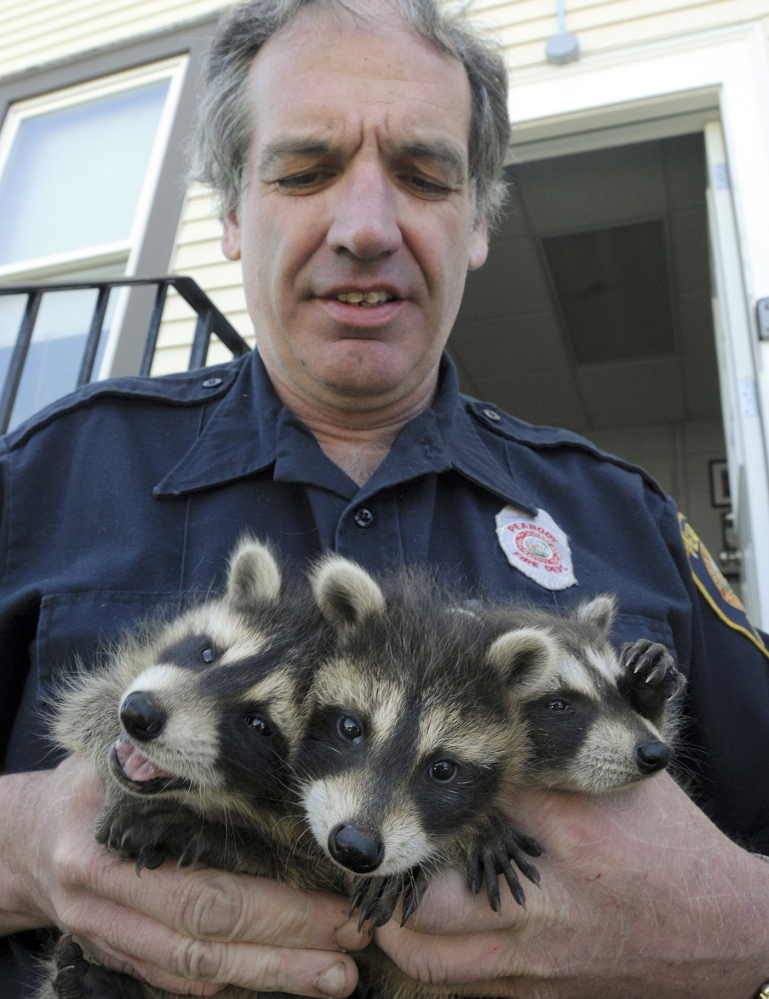NEWBURYPORT, Mass. — When Peabody firefighter John Spofford pulls up to the station to start his shift, he’s not alone. In the back of his pickup truck are raccoons in cages, or sometimes rabbits or other small animals. He carries a bag of baby bottles filled with formula.
Spofford, 51, is a licensed wildlife rescuer. He lives in Salem and also has an auto repair shop in Peabody.
“When I’m away from fighting fires and away from the garage, I like to go home to the animals,” he said.
Spofford specializes in rescuing small, orphaned mammals and cares for them until they’re ready to re-enter the wild. That means up to 50 animals live in cages in his basement or backyard for months at a time. Young raccoons are usually with him from April until September or October.
Critters that need close monitoring go to work with him. The raccoons aren’t allowed inside the station, per order of the chief, so Spofford checks on them periodically throughout the day and gives them their bottles.
“There just never seems to be enough people involved with wildlife,” he said.
In fact, many animal control officers and other animal activists are not licensed for wildlife rescue and rehab; there are only 50 to 60 in the state, Spofford said. As a result, the most common recourse for orphaned wildlife is euthanasia.
Training and certification are needed, he said, because these animals – from coyotes to river otters – are not pets. He limits their contact with human visitors for that reason; only he and his daughter Shannon interact with the animals regularly.
Rescuers are trained to spot signs of illness, particularly rabies, and to care properly for young, healthy animals. Spofford even underwent pre-exposure to rabies, which is a vaccination that greatly reduces the chance that he’ll contract it from a rabid animal.
When local police, fire or animal control officers come across an injured wild animal, their first call is often to Spofford. He gets calls from private citizens, as well.
Sometimes, all it takes is a little friendly help. A couple of years ago, for example, he freed a coyote stuck in a fence at a Salem home. He arrived to find the animal with its two hind paws sticking through the top of the fence while it stood on its front paws in the snow. He checked the coyote for injuries and then knocked off the top of the pickets. The animal yowled and scampered away.
Fellow firefighter Russell Lewis was part of a recent duck rescue at Northshore Mall when six ducklings took a 15-foot plunge down a grate. Spofford wasn’t there, but Lewis said that after firefighters rescued the ducks and turned them over to the animal control officer, the first thing she told them was she’d take the ducks right over to Spofford.
He called the station later to confirm that the ducklings had arrived safely.
Spofford became involved with animal rescue 20 years ago and assisted others for several years before becoming licensed himself last year. Despite state certification and licensure, the job is completely voluntary. Spofford pays the bills for food and medical care. It costs him $150 to $200 a week for the raccoons’ milk.
Right now, he has 25 raccoons, 10 squirrels and three or four cottontail rabbits down in his basement. He also has five cats and a Flemish giant rabbit, but those are pets.
Once the animals are ready to transition to the second stage of care, they move to larger cages in his backyard before finally heading to a friend’s farm in Peabody. At that point, the animals are placed in prerelease cages, where they slowly get acclimated to nature.
When they’re ready, he said, “they go climb a tree, and we walk away.”
Send questions/comments to the editors.



Comments are no longer available on this story